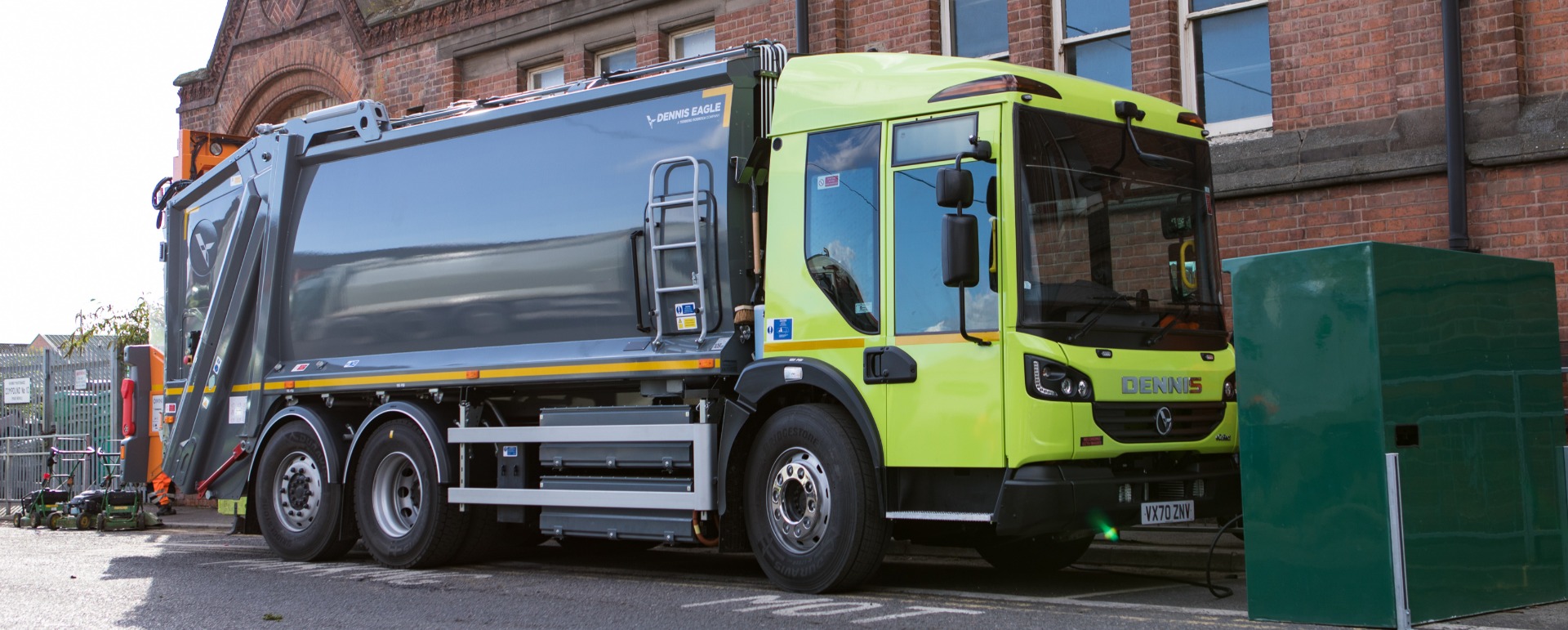The first fully integrated, OEM-designed, all-electric refuse collection vehicle (eRCV) - Dennis Eagle’s eCollect - is going into service with customers around the UK.

The eRCV produces zero emissions, helping operators play a significant role in tackling climate change and local air quality.
This productionised vehicle has been thoroughly tested for functional safety and optimised for the rugged nature of waste collection. And while orders for the vehicle have already been received from many customers, Sales & Marketing Director Richard Taylor said the moment the first eRCV rolled off the production line at Warwick was a landmark, both for the waste and recycling industry and in the development of electric vehicles.
“The zero-emissions eCollect is a viable alternative to our best-selling diesel vehicle – both commercially and operationally – but it represents much more than that,” he said.
“If you consider that RCVs routinely visit every street where people live in every community in the country, the positive impact of having an emissions-free option in our industry is very significant indeed.
“The fact that we have reached the point where we can produce a 26-tonne vehicle for such an energy-demanding role also speaks volumes about how far electric vehicles have developed in recent years and how much more widespread they will become in the near future.”
Andrew Smith, Nottingham City Council’s Assistant Manager (Fleet), said: “The electric RCV is the Holy Grail of municipal vehicles and we have wanted one for years. So, to finally get our hands on them and put them in to service emptying bins is very satisfying indeed.
“Both eCollects are in operation and both are out-performing the diesels they replaced.
“In the first few weeks we have had these two vehicles in operation we have saved around 60 to 70 litres of diesel per truck per day.
“The drivers love them - they don’t want to go back to diesel RCVs. Our eCollects have been going out at 6.30am and finishing at around 1.30pm, collecting a full load then a smaller one - up to 18 tonnes in total. But they’re coming back with 40% charge remaining. The vehicles are finishing quicker, shaving around an hour off the run time.
“Drivers have a full debrief every day and it’s all positive. They say they’re are easier to drive and they particularly love the extra torque. Parts of Nottingham are quite hilly and diesel trucks can struggle with a big load but these eCollects take it in their stride.
“So, all in all, we’re delighted with them. And we’re about to increase our charging infrastructure so we can expand our electric fleet - including more eRCVs - next year.”
The design of eCollect was based on Dennis Eagle’s market leading diesel vehicles to provide as much reliability and familiarity to everyone working with it, including drivers, operators, and maintenance teams.
The Elite 6x2 rear steer chassis with Olympus 19m3 body and Terberg automatic split bin lift were all designed to work with each other and together they represent the best-selling vehicle configuration in Dennis Eagle’s catalogue.
The narrow chassis, body and bin lift were chosen as they are most suitable for the intense urban rounds the eCollect is designed to operate on. But the engine, transmission and all the other diesel-associated components have been replaced by battery packs providing up to 300kWh of charge and a 200kW electric drivetrain.
Before it could be launched, the eCollect was put through two years of exhaustive safety and efficiency tests to check and fine-tune its durability, its electrical safety, ride and handling.
Functional Safety Tests alone took thousands of hours but confirmed the vehicle would remain totally safe while operating in the nation’s streets.
Finally, it underwent homologation compliance tests enabling the eCollect to get full European Community Whole Vehicle Type Approval (ECWVTA) before it was delivered to Nottingham City Council.
Richard Taylor added: “Such extensive testing requires a huge investment in time, money and resources and consequently, this is the hallmark of an original equipment manufacturer (OEM). It means our customers can feel totally confident that the eCollect will deliver what they are expecting in terms of safety, efficiency and operational costs.
“We’re delighted that Dennis Eagle has made such a significant contribution to the health and well-being of the environment we all live in and we're proud of the team that has delivered this outstanding achievement.”
Cllr Sally Longford, Deputy Leader of Nottingham City Council and Portfolio Holder Energy, Environment and Democratic Services, said: “The two electric refuse collection vehicles we’re buying are amongst the first off the production line – which is very exciting for Nottingham. This is recognition of Nottingham’s place as a leader in the EV field and putting innovative EVs into operation.
“These vehicles are yet another first for Nottingham, adding to our award-winning, innovative fleet of zero emission vehicles which already boasts the first fully electric sweepers, cage tippers and minibuses to be run by a local authority in the UK. We are leading by example and electrifying the refuse collection fleet is a major step forward in our aims to deliver clean air in our city and a huge step towards our carbon neutral goals.
“Thirty per cent of our vehicles are fully electric, with no emissions whatsoever and these eRCVs further underline our commitment to having a fleet which consists of as many zero and ultra-low emission vehicles (ULEV) as possible by 2028.”